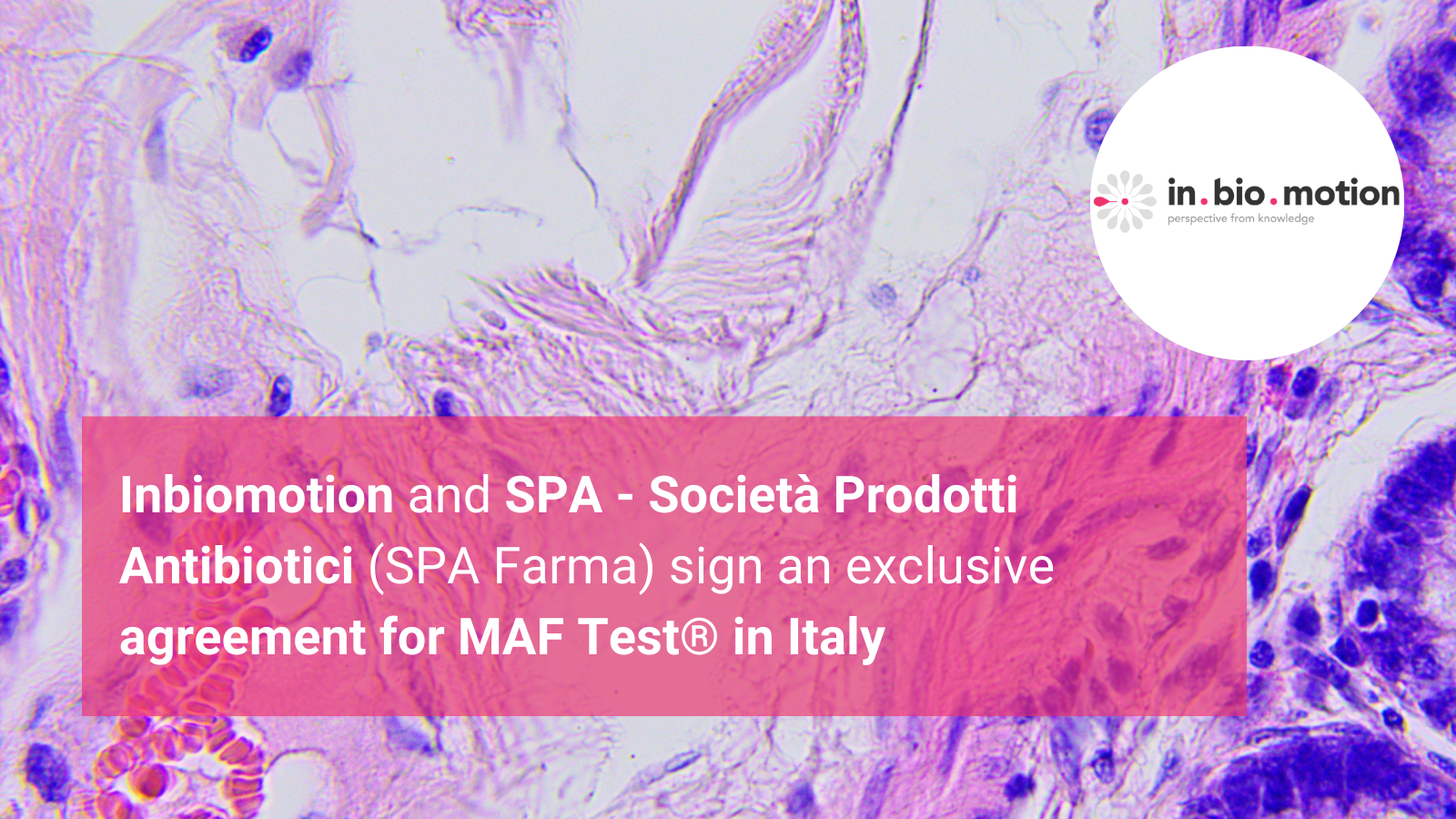10 November 2023
Publication in Nature Cell Biology deciphers the mechanism by which the MAF protein promotes breast cancer metastasis

The work from Inbiomotion’s co-founder Dr. Roger Gomis and his Lab at IRB Barcelona has been published in the journal Nature Cell Biology.
The MAF protein interacts with the estrogen receptor, alters its function, and promotes the spread of cancer.
Results opens the possibility of an additional clinical utility of MAF Test®.
Barcelona, November 10, 2023 – Inbiomotion SL, a company commercializing its proprietary MAF-TEST® for identifying high risk early-stage breast cancer patients that could be eligible for bisphosphonate adjuvant therapy has announced today the publication in Nature Cell Biology of key data further elucidating the biology around the MAF biomarker.
Breast cancer is the most common form of cancer among women, with more than 2 million new cases diagnosed each year. In cases where the tumor remains localized in the breast, survival rates are remarkably high, at around 90%. However, the spread of cancer cells beyond breast tissue and the formation of metastases in other organs dramatically worsens the prognosis and poses significant challenges. Approximately 1 in 8 women will develop breast cancer in their lifetime and, of these, 15 20% will eventually develop metastases. Therefore, being able to identify those patients with a higher risk of recurrence and being able to personalize their treatment is vital for their survival and quality of life.
A team from IRB Barcelona led by ICREA researcher Dr. Roger Gomis, co-founder of Inbiomotion, has revealed the mechanism by which the MAF protein increases the risk of metastasis in breast cancer patients. This finding is a crucial step in understanding the molecular basis of metastasis and has relevant clinical implications for treatment.
The research team has detailed in the journal Nature Cell Biology how the MAF protein interacts with the estrogen receptor, a key element in the development of breast cancer, modifying its structure. This interaction leads to DNA restructuring, which allows the activation of genes that favor metastasis, particularly in response to estrogen. These findings imply that patients with high levels of MAF protein have a greater risk of developing metastasis.
Dr. Roger Gomis comments, “This study opens the possibility of preventing metastasis by preventing the activation of pro-metastatic genes. This offers new perspectives in the treatment of breast cancer and the clinical utility of MAF-TEST® could be extended to select high-risk patients for extended hormonal therapy and for selecting patients to be included in clinical trials to test the use of new class of drugs -SERDs- in the adjuvant setting as is being carried out by various global pharmaceutical companies.”
The MAF-TEST® is already being commercialized in Europe predicts the prognosis of breast cancer patients and helps oncologists to identify those patients who may be able to prevent recurrence and benefit from adjuvant treatment with bisphosphonates, which are commonly used to treat osteoporosis. The test also identifies those patients whose prognosis would worsen if treated with bisphosphonates.
In the past, MAF-TEST® was used to analyze biopsies from two landmark clinical trials, each with more than 3,000 patients (AZURE and NSABP-B34). These results were published in The Lancet Oncology (2017) and the Journal of National Cancer Institute (2021) respectively, where it was shown that 80% of patients with breast tumors had MAF-negative tumors and that being treated with clodronate or zoledronic acid increased their disease-free survival by 14.3% and decreased their relative risk of death by 21.4%. In contrast, patients with MAF-positive tumors had no benefit, or even worse prognosis, from treatment with bisphosphonates (zoledronic acid or clodronate), irrespective of their menopausal status.
Full publication – Nature Cell Biology
About Inbiomotion
Inbiomotion SL is a spin-off of IRB Barcelona and ICREA, founded in 2011 by Dr. Roger Gomis, following the identification of the MAF gene as a biomarker to predict bone metastasis in breast cancer. Inbiomotion has developed a diagnostic kit based on the detection of MAF gene amplification, the MAF-TEST®, to promote precision medicine and improve the treatment of breast cancer patients. Inbiomotion recently signed an exclusive distribution agreement for Spain and Portugal with Palex Medical and is seeking additional distributors. The company’s main investors are Ysios Capital, Caixa Capital Risc, Alta Life Sciences and the Vila Casas Foundation.For more information, please visit www.inbiomotion.com.
About the MAF gene
MAF (mesenchymal aponeurotic fibrosarcoma gene, a transcription factor of the AP-1 family) is amplified in primary cancer tumors. It is associated with increased metastasis, especially bone metastasis. MAF transcriptionally controls genes such as PTHrP, which regulates metastasis-related cellular processes such as survival, initiation, metabolic rewiring and adhesion to bone marrow-derived cells and osteoclast differentiation. These observations indicate that the MAF gene has a key hierarchical role in metastasis. The MAF gene has been found to be amplified in 20% of breast cancer patients. In the case of patients with non-metastatic breast cancer, having amplified (MAF positive) or not (MAF negative) MAF has been associated with a very different response to bisphosphonate treatment, significantly impacting the survival of patients who are MAF negative.
Contact
Inbiomotion
Joël Jean-Mairet, PhD
Executive Chair
jjean-mairet@inbiomotion.com
www.inbiomotion.com


